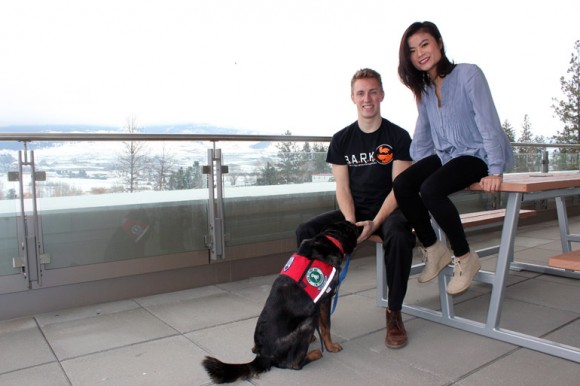
Students Charlie Drummond and Christy Hui have organized BARK2GO and will station volunteers and therapy dogs in three different locations across UBC’s Okanagan campus every Wednesday.
Building Academic Retention through K9s expands across campus
Students are lining up at UBC Okanagan’s campus—and it’s not for Tim Hortons.
Each semester more than 1,000 students attend Building Academic Retention through K9s (BARK) to spend time with registered therapy dogs. Due to increasing demand, the program is expanding and starting this week, UBC Okanagan students will have increased access to BARK, with the new BARK2GO.
Founded and led by John-Tyler Binfet, assistant professor in the Faculty of Education, and funded by the Office of the Associate Vice-President Students, BARK offers students who are feeling homesick or stressed time to spend with trained therapy dogs through a weekly drop-in program. In its third year, BARK now has a pool of more than 40 community volunteers and certified therapy dogs.
Building on the success of BARK and recognizing that not everyone can get to the weekly BARK session, BARK2GO will station volunteers and therapy dogs in three campus locations—the Fipke Centre, the Engineering, Management and Education building, and the Library—every Wednesday from 2 to 3:30 p.m.
“BARK has built a strong identity on campus, and students know they can come and de-stress,” says Charlie Drummond, BARK2GO volunteer coordinator. “The difference with BARK2GO, is that we will be able to offer a quick BARK fix between classes or exams.”
The expansion is a result of BARK outgrowing its weekly drop-in space in the Innovative Learning Centre—typically more than 100 students were and lining up for the weekly sessions.
Binfet and his team were optimistic when they learned about Pitch This!—a grant competition which invited students, faculty, staff, and alumni to forward ideas to boost wellbeing on campus. A successful pitch by Drummond and fellow student Christy Hui was the first step to launching BARK2GO.
“We hope that the outreach will raise awareness about the program,” says Hui, a former BARK participant, and BARK2GO coordinator. “I remember when I was really stressing out in my first year, and I looked forward to coming to the BARK sessions to relax and de-stress. I really hope that BARK2GO will connect with more students, and offer them the same benefits.”
Binfet is thrilled to see his student volunteers taking this initiative, and he says it is UBC Okanagan’s many supporters that make BARK and their new initiative possible.
“BARK plays a role in supporting the well-being of our students on campus and BARK2GO is an extension of the work we do in ensuring that students have access to therapy dogs in a safe and comfortable environment,” says Binfet. “BARK is their home away from home.”
For more information on BARK visit barkubc.ca.
—30—